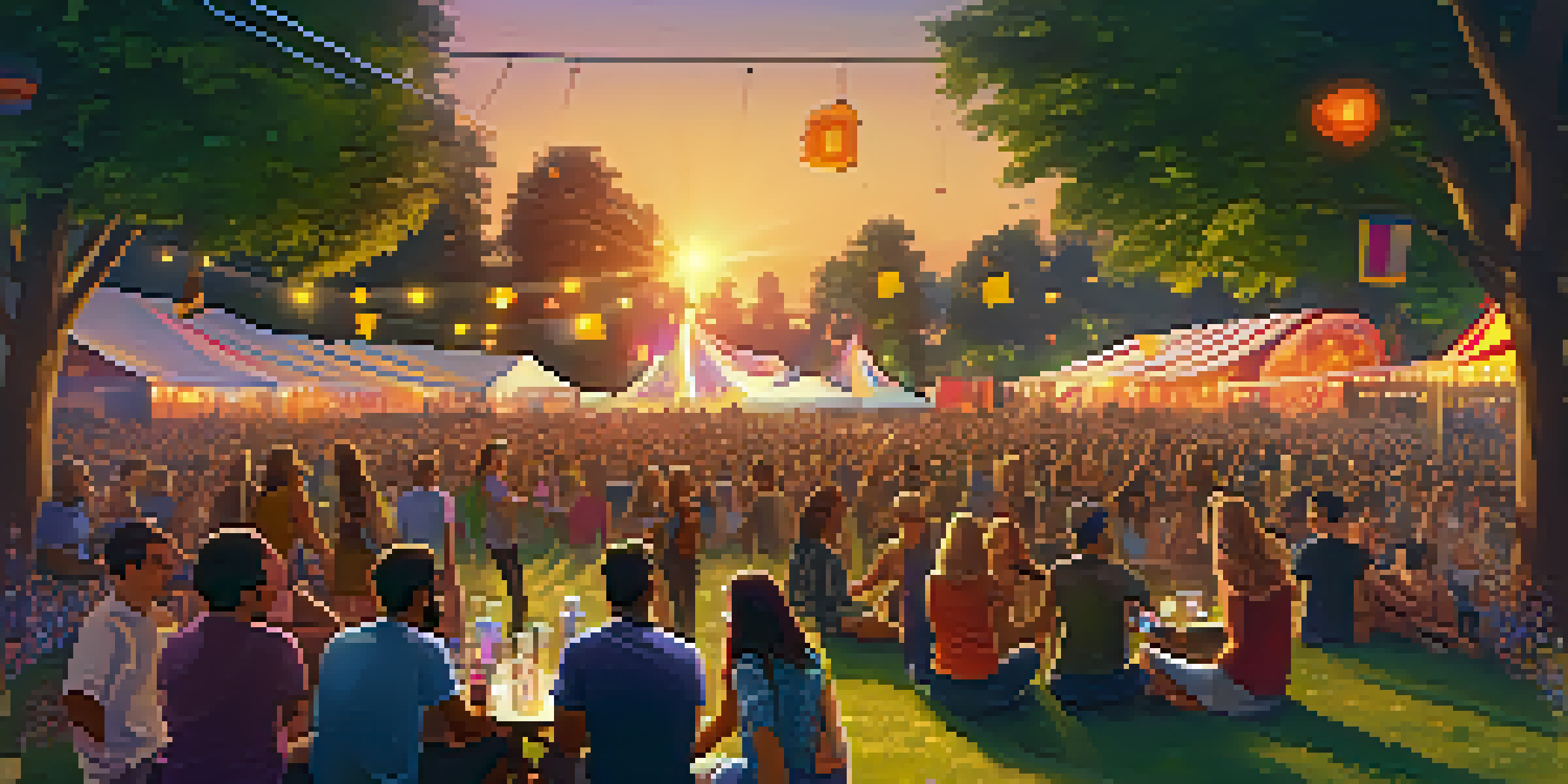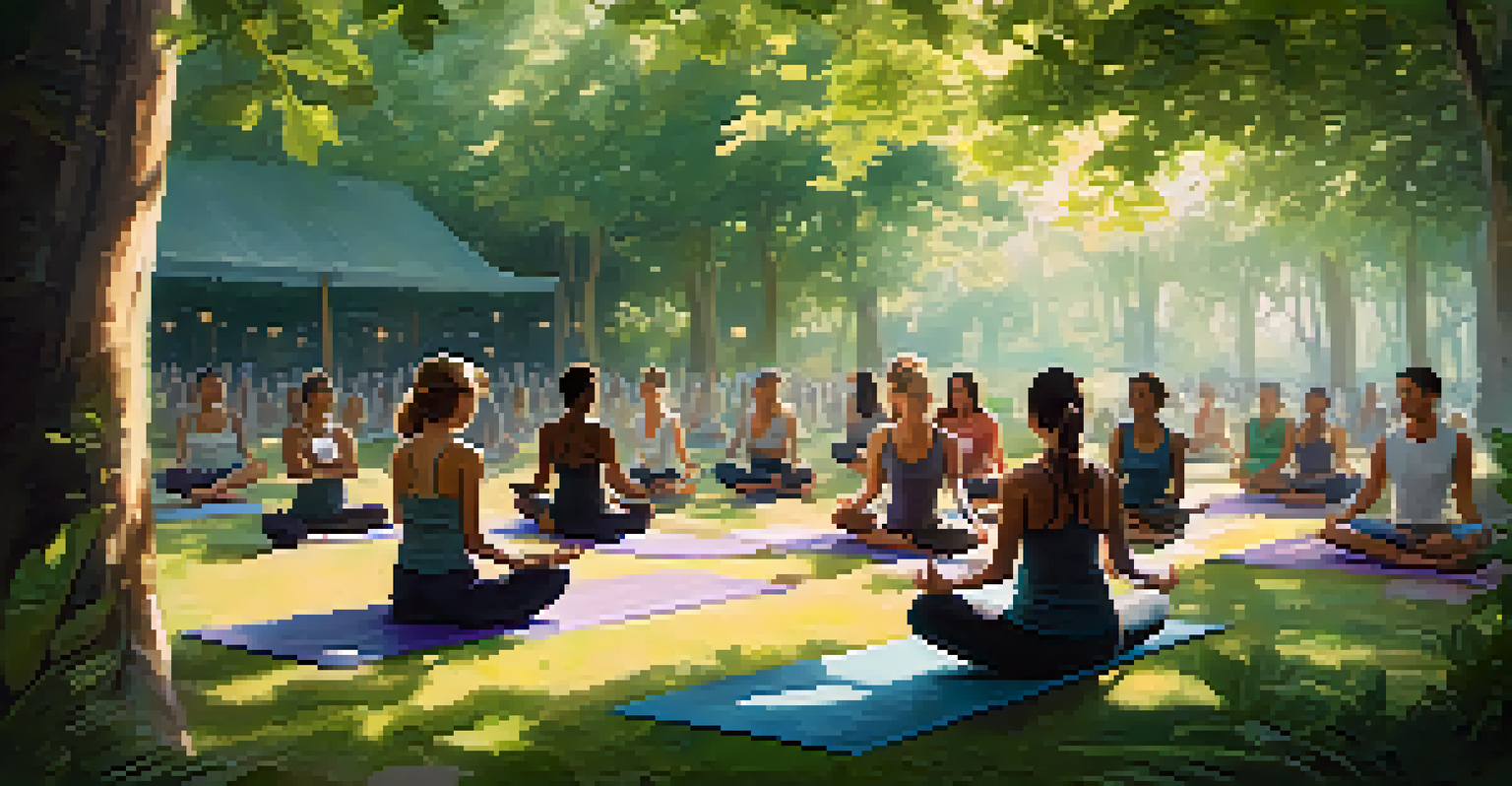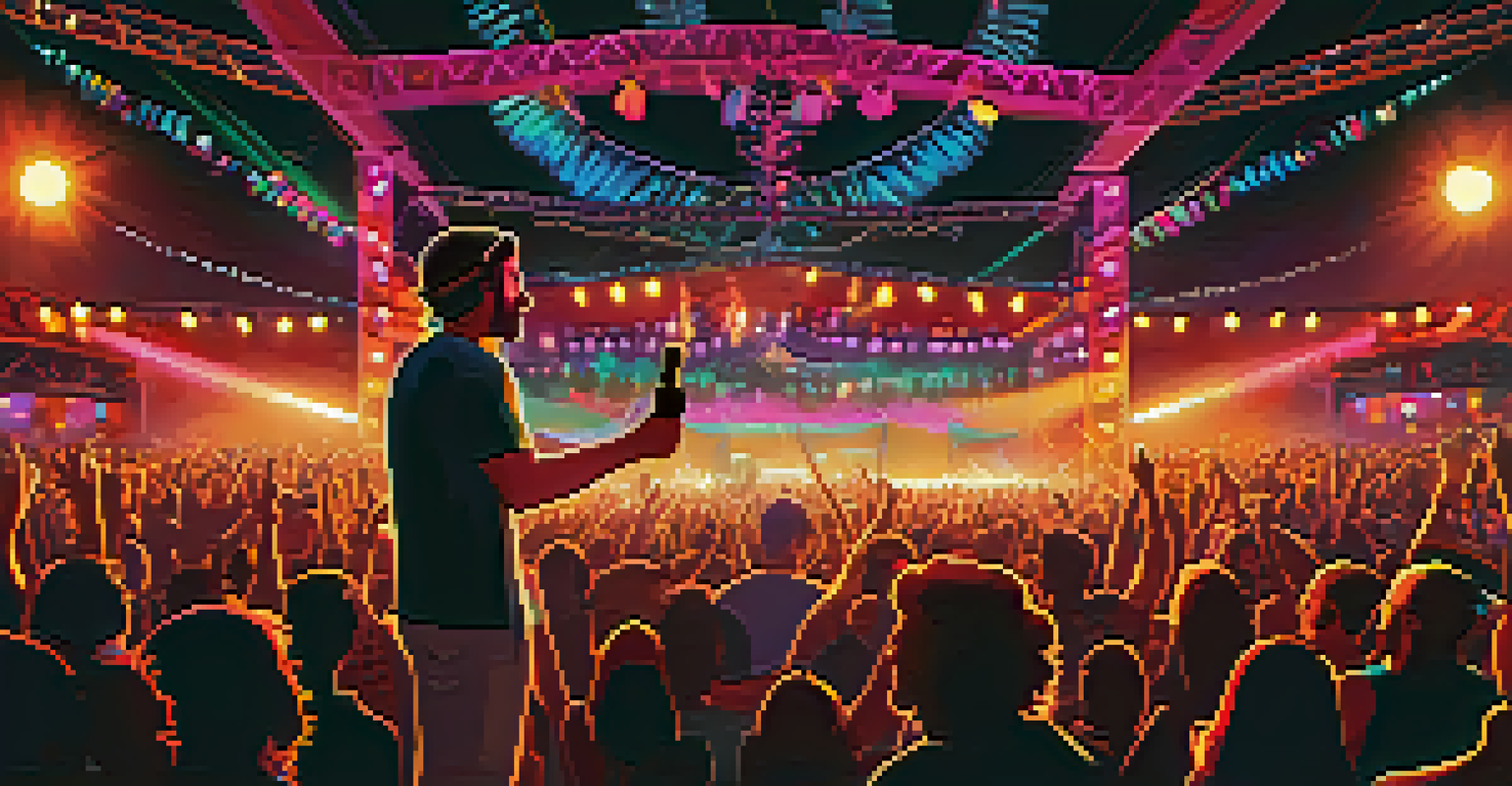The Role of Music Festivals in Mental Health Awareness

Understanding the Connection Between Music and Mental Health
Music has an incredible ability to evoke emotions, making it a powerful tool for mental health. It can uplift spirits and offer solace during tough times, helping people express feelings they might otherwise keep bottled up. The connection between music and emotional well-being is well-documented, with studies suggesting that music can reduce stress and anxiety levels.
Music can change the world because it can change people.
When people come together at music festivals, they not only enjoy the performances but also share a collective experience that fosters connection. This shared atmosphere can remind us that we’re not alone in our struggles, creating a sense of belonging that can be healing. In essence, music becomes a vehicle for emotional expression and community support.
As we delve deeper into the role of music festivals, it’s essential to recognize how these events can raise awareness about mental health issues. With so many attendees, they provide a unique platform to spark conversations about mental well-being and promote resources available for those in need.
Creating Community and Support Networks at Festivals
One of the most significant advantages of music festivals is their ability to create communities. When individuals gather around a shared love for music, they naturally form connections, which can be incredibly beneficial for mental health. These connections often lead to friendships that extend beyond the event, providing a support network for attendees.

In many cases, festivals offer mental health resources on-site, such as counseling services or workshops focused on mental well-being. This proactive approach not only raises awareness but also encourages attendees to seek help if needed. By integrating mental health initiatives into the festival experience, organizers are reinforcing the message that caring for one's mental health is just as important as enjoying the music.
Music Festivals Foster Community
Music festivals create a sense of belonging, allowing attendees to connect and support each other, which is vital for mental health.
Furthermore, these communities can serve as safe spaces where people feel free to express themselves without fear of judgment. This sense of safety is crucial for those dealing with mental health challenges, as it promotes openness and vulnerability, which are key components of healing.
The Role of Artists in Promoting Mental Health Awareness
Artists play a pivotal role in shaping conversations around mental health at music festivals. Many musicians openly share their own struggles with mental health, using their platforms to destigmatize these issues. This act of vulnerability can resonate deeply with fans, encouraging them to seek help or talk about their own experiences.
The beautiful thing about music is that it connects people. It brings them together, and they share experiences that can heal.
By addressing mental health in their music and during performances, artists create a narrative that resonates with their audience. For example, songs that tackle themes of anxiety, depression, or the importance of self-care can inspire listeners to reflect on their own mental health journeys. This connection provides a powerful reminder that they’re not alone in their feelings.
Moreover, artists often collaborate with mental health organizations during festivals, spreading awareness through merchandise or informational booths. This partnership not only amplifies the message but also provides tangible resources for attendees who may be struggling.
Workshops and Activities to Foster Mental Well-Being
Many music festivals now include workshops and activities aimed at promoting mental well-being. These might involve yoga sessions, mindfulness workshops, or even art therapy, all of which encourage attendees to take a moment for self-care amidst the excitement of the festival. These activities provide a break from the noise and chaos, allowing individuals to reconnect with themselves.
Offering these options creates an environment where mental health is prioritized, encouraging festival-goers to think about their emotional state. For instance, a guided meditation session can help attendees manage anxiety and stress, making their overall experience more enjoyable. This proactive approach helps create a balanced festival experience that values both fun and mental health.
Artists Advocate for Mental Health
Musicians use their platforms to openly discuss mental health, encouraging fans to share their struggles and seek help.
Moreover, such activities can inspire attendees to incorporate these practices into their daily lives. By learning simple techniques for managing stress, individuals are more likely to continue prioritizing their mental health long after the festival ends.
Utilizing Social Media to Spread Awareness
In today's digital age, social media plays a vital role in spreading awareness about mental health at music festivals. Festivals often leverage platforms like Instagram and Twitter to share messages about mental health resources available on-site. This outreach ensures that attendees are informed and can access help if needed.
Additionally, artists and influencers frequently share their own experiences with mental health on social media, sparking important conversations. These discussions can reach a wider audience, breaking down stigma and encouraging people to talk about their mental health journeys. It's a powerful reminder that the festival experience extends beyond the physical event.
The hashtag movement is particularly effective, as festival-goers can share their stories and support one another online. This sense of community continues long after the festival ends, creating a lasting impact on mental health awareness.
Testimonials: Real Stories from Festival Attendees
Hearing personal stories from festival attendees can provide insight into the positive impact these events can have on mental health. Many individuals credit festivals with helping them find a sense of belonging, especially during times of personal struggle. For instance, a young woman might share how attending a festival helped her cope with anxiety, allowing her to connect with others who understood her experience.
These testimonials serve as powerful reminders that music festivals can be more than just entertainment; they can be a lifeline for those in need. When people share their stories, it not only validates their experiences but also encourages others to seek help. By highlighting these narratives, we can further emphasize the importance of mental health awareness in our communities.
Workshops Enhance Mental Well-Being
Festivals now include wellness activities like yoga and meditation, promoting self-care and emotional health among attendees.
Moreover, sharing these stories through festival platforms can inspire change within the industry. By showcasing the positive effects of these experiences, organizers can continue to innovate and incorporate mental health initiatives into their future events.
Looking Ahead: The Future of Mental Health at Festivals
As the conversation around mental health continues to grow, it's exciting to consider the future of music festivals and their role in this movement. Many organizers are already exploring new ways to enhance mental health initiatives, from integrating more workshops to collaborating with mental health organizations. This trend indicates a commitment to prioritizing the well-being of attendees.
Innovative ideas, such as creating designated quiet spaces for reflection or offering personalized mental health resources, could transform the festival experience. By placing a stronger emphasis on mental health, organizers can create an environment that promotes healing and connection, making festivals more inclusive for everyone.

Ultimately, the goal is to ensure that music festivals continue to be spaces where mental health awareness is not just an afterthought, but a fundamental part of the experience. By doing so, we can foster a culture of support and understanding, helping to break the stigma surrounding mental health and encouraging everyone to prioritize their well-being.